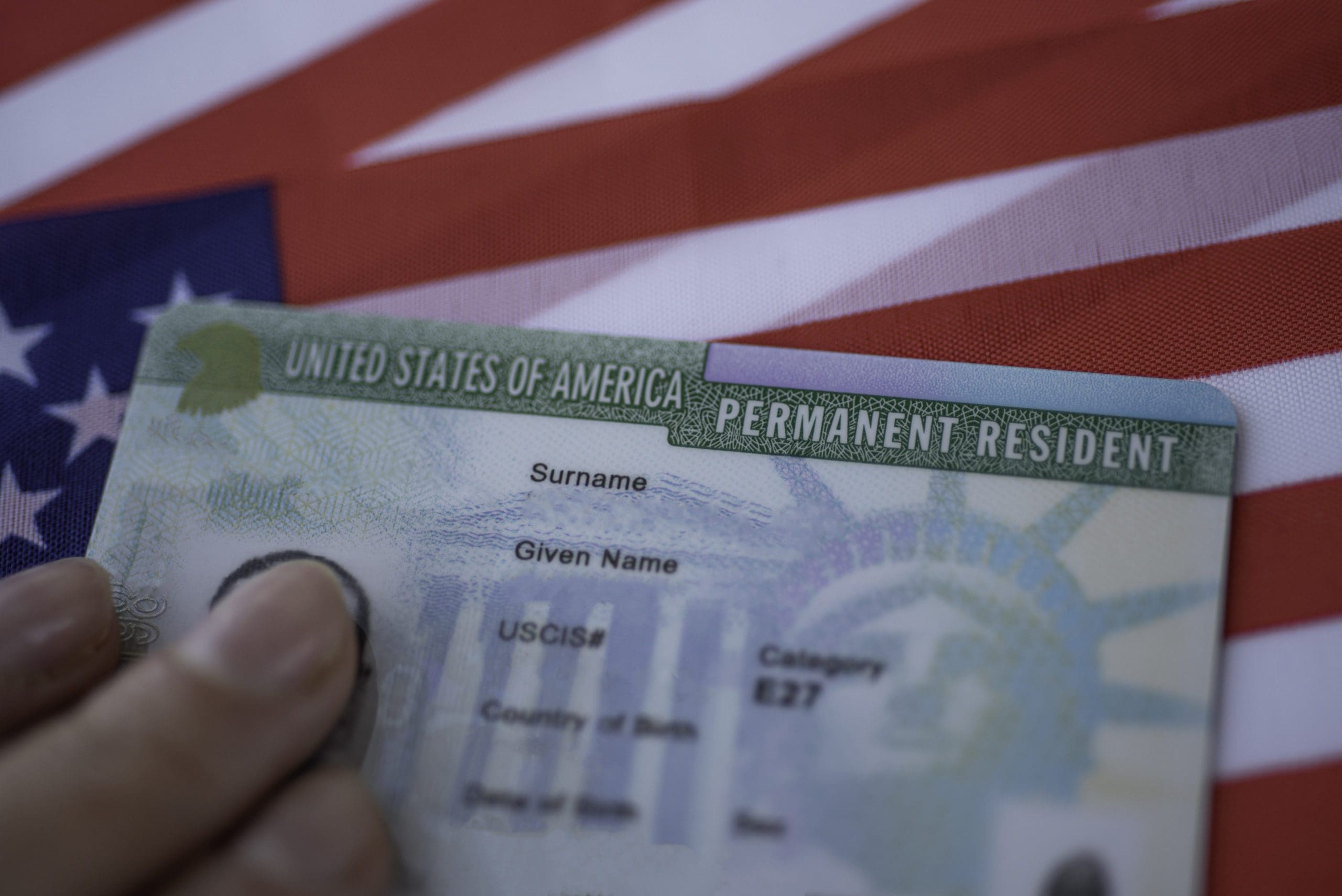There are five Employment-Based (EB) visas/green cards denoting preference that give an individual permanent residency in the United States.
The EB visa group of green cards covers various employment-based immigration options. Employment-based visas require a solid case to get approved by the United States and Immigration Services (USCIS).
Some employment-based immigrant visas require a PERM Application or Labor Certification from the Department of Labor and some do not.
Non-immigrant employment-based visas such as the H-1B, L-1, or P visas can lead to an EB-type green card.

Permanent Resident Green card of United states of America on flag of USA. Above close-up view.
EB-1 Visa/Green Card: Exceptional Ability
The EB-1 visa is a first preference employment-based visa reserved for foreign nationals who demonstrate extraordinary ability in their field. Qualifying areas can be science, arts, education, business, or athletics. Evidence proving extraordinary is outstanding achievements by "sustained national or international acclaim."
There are three broad EB-1 visa types:
- EB-1a visa: Extraordinary Ability green card.
- EB-1b visa: Outstanding Professor or Researcher green card.
- EB-1c visa: Managers or Executives of multinational companies.
EB-1 Visa Requirements and Application Process Overview
The EB-1 is seen as particularly desirable because the priority dates are current. The EB-1 does not require a PERM Application or Labor Certification from the Department of Labor to ensure no qualified workers can fill the position.
EB-2 Visa/Green Card:
Advanced Degree or Exceptional Ability
The EB-2 visa is a second preference employment-based visa. It is typically for graduates with an advanced degree or a foreign national with exceptional ability in their area of specialization.
Another option is the EB-2 National Interest Waiver (NIW), which does not require the PERM or Labor Certification process. This fast-tracks applications for individuals who can prove their specialty is in U.S. national interest.
EB-2 Visa Requirements and Application Process
The EB-2 NIW is a unique path to securing residency and can be a viable option for Entrepreneurs.
EB-3 Visa/Green Card:
Skilled, Professional, or Other Workers
The EB-3 visa is a third preference employment-based green card for skilled, professional, or other workers. EB-3 visa requirements are somewhat less stringent than the EB-1 and EB-2; as a result, the wait often takes more time.
- Skilled: two years of training, experience, or job education (sometimes relevant post-secondary education).
- Professional: Baccalaureate degree or equivalent.
- Other/Unskilled: or in some cases less than two years of training or experience.
(Excludes jobs of a temporary or seasonal nature.)
EB-3 Visa Requirements and Application Process
USCIS awards about forty thousand EB-3 visas each year, and the employer has to complete the PERM labor certification process.
EB-4 Visa/Green Card: Special Immigrants
The EB-4 visa is a fourth preference employment-based green card for special immigrants. It was designed as a catch-all for immigrants whose situation does not fit the other categories. The EB-4 visa is often given to religious workers but applies to other circumstances such as armed forces and physicians.
There are 10,000 EB-4 visas awarded each year.
EB-5 Visa/Green Card: Investors
The EB-5 visa is a fifth-reference employment-based green card for foreign investors with significant funds for investing in a U.S. company. A few options for EB-5 investments include a new company or an existing failing company.
A wide range of investment options meets USCIS conditions for approval existing across various fields and industries. Including medical facilities, manufacturing, agriculture, and real estate development, hotels, restaurants, casinos, and stadiums.
EB-5 Visa Requirements and Application Process
The EB-5 Investor Visa is often faster than other employment-based visas and doesn't require a PERM Application/Labor Certification. An attractive path for foreign nationals with significant capital for securing permanent residency.
Invest in the U.S. and Bypass the 70-year Backlog
Immediate family members (spouse and any unmarried children under 21) may qualify to stay in the U.S. through a separate application. They may also be allowed to study or work by successfully applying for EAD: Employment Authorization Document.
